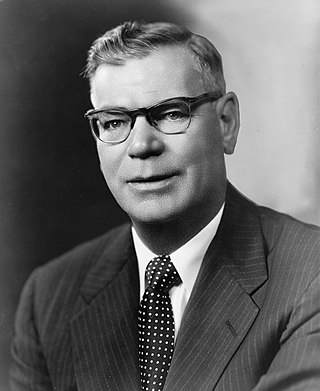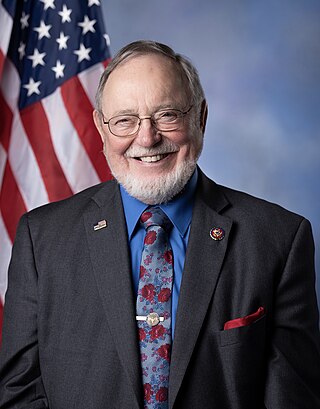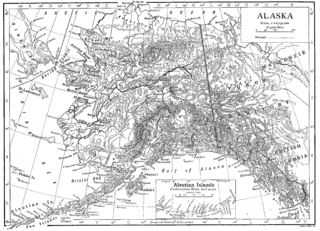Related Research Articles

Edward Lewis "Bob" Bartlett, was an American politician and a member of the Democratic Party. He served as a U.S. Senator. A key fighter for Alaska statehood, Bartlett served as the Secretary of Alaska Territory from 1939 to 1945, in Congress from 1945 to 1959 as a Delegate, and from 1959 until his death in 1968 as a U.S. senator. He was opposed to U.S. involvement in Vietnam, along with his fellow Senator Ernest Gruening, and also worked to warn people about the dangers of radiation. Many acts bear his name, including a major law known as the Bartlett Act, mandating handicap access in all federally-funded buildings.

Donald Edwin Young was an American politician from Alaska. He is the longest-serving Republican in House history, having been the U.S. representative for the state's at-large congressional district for 49 years, from 1973 until his death in 2022.

The 1986 United States Senate elections were elections for the United States Senate. Held on November 4, in the middle of Ronald Reagan's second presidential term, the 34 seats of Class 3 were contested in regular elections. The Republicans had to defend an unusually large number of freshman Senate incumbents who had been elected on President Ronald Reagan's coattails in 1980. Democrats won a net of eight seats, defeating seven freshman incumbents, picking up two Republican-held open seats, and regaining control of the Senate for the first time since January 1981. This remains the most recent midterm election cycle in which the sitting president's party suffered net losses while still flipping a Senate seat.

The 1984 United States Senate elections were held on November 6, with the 33 seats of Class 2 contested in regular elections. They coincided with the landslide re-election of President Ronald Reagan in the presidential election. In spite of the lopsided presidential race, Reagan's Republican Party suffered a net loss of two Senate seats to the Democrats, although it retained control of the Senate with a reduced 53–47 majority.

The 1958 United States Senate elections were elections for the United States Senate which occurred in the middle of President Dwight D. Eisenhower's second term. Thirty-two seats of Class 1 were contested in regular elections, the new state of Alaska held its first Senate elections for its Class 2 and 3 seats, and two special elections were held to fill vacancies.

The 1932 United States House of Representatives elections were elections for the United States House of Representatives to elect members to serve in the 73rd United States Congress. They were held for the most part on November 8, 1932, while Maine held theirs on September 12. They coincided with the landslide election of President Franklin D. Roosevelt.

1914 United States House of Representatives elections were elections for the United States House of Representatives to elect members to serve in the 64th United States Congress. They were held for the most part on November 3, 1914, while Maine held theirs on September 14. They were held in the middle of President Woodrow Wilson's first term.
The 1910 United States House of Representatives elections were held for the most part on November 8, 1910, while Maine and Vermont held theirs early in September, in the middle of President William Howard Taft's term. Elections were held for all 391 seats of the United States House of Representatives, representing 46 states, to the 62nd United States Congress.
The 1908 United States House of Representatives elections were held for the most part on November 3, 1908, with Oregon, Maine, and Vermont holding theirs early in either June or September. They coincided with the 1908 United States presidential election, which William Howard Taft won. Elections were held for all 391 seats of the United States House of Representatives, representing 46 states, to serve in the 61st United States Congress.

The 1868–69 United States House of Representatives elections were held on various dates in various states between June 1, 1868, and August 2, 1869. Each state set its own date for its elections to the House of Representatives before or after the first session of the 41st United States Congress convened on March 4, 1869. They coincided with the 1868 United States presidential election, which was won by Ulysses S. Grant. Elections were held for all 243 seats, representing 37 states. All of the former Confederate states were represented in Congress for the first time since they seceded from the Union.

John Bruce "Jack" Coghill was an American politician and businessman who was the sixth lieutenant governor of Alaska from 1990 to 1994, serving under Governor Walter Hickel. Both were members of the Alaskan Independence Party.

Alaska Territory's at-large congressional district was a congressional district created in 1906 to represent the District of Alaska, which was reorganized into the Alaska Territory in 1912. After Alaska's admission to the Union as the 49th state by act of Congress on January 3, 1959, this district evolved into Alaska's at-large congressional district.
This is a list detailing the electoral history of the Libertarian Party in the United States, sorted by office. The list currently consists of candidates who ran for partisan office.

Bettye Jean Davis was an American social worker and politician. She was the first African-American to be elected as an Alaska State Senator in 2000.

The 2012 United States House of Representatives election in Alaska was held on Tuesday, November 6, 2012, to elect the U.S. representative from Alaska's at-large congressional district, who will represent the state of Alaska in the 113th United States Congress. The election coincided with the elections of other federal and state offices, including a quadrennial presidential election. As is the case every twelve years in Alaska, this was the only statewide election contest in the state held in 2012. A primary election was held on August 28, 2012.

The 1974 United States Senate election in Alaska took place on November 5, 1974. Incumbent Democratic U.S. Senator Mike Gravel was re-elected to a second term in office, defeating Republican State Senator Clyde "C.R." Lewis. This is the last time that a member of the Democratic Party has won the Class 3 Senate seat in Alaska. It is also the last time a person not named Murkowski has won this seat. Democrats did not win another Alaska U.S. Senate race until 2008.

The 1968 United States Senate election in Alaska took place on November 5, 1968. Incumbent Democratic U.S. Senator Ernest Gruening ran for a second full term in office but finished behind Speaker of the Alaska House of Representatives Mike Gravel in the Democratic primary. Gruening launched a write-in bid for the seat in the general election, but finished third to Gravel and Republican former Anchorage mayor Elmer Rasmuson.

The 1958 United States Senate elections in Alaska were held November 25, 1958. The elections were held in anticipation of Alaska's admission as the forty-ninth state in the union, effective January 3, 1959. The state held two simultaneous elections to determine their first senators.

Ivy Spohnholz is a Democratic member of the Alaska House of Representatives, serving the 16th district. She has served since March 10, 2016, after being appointed by Governor Bill Walker to fill the vacancy caused by the death of longtime Representative Max Gruenberg on February 14, 2016. She was elected to a full term on November 8, 2016, with 51.52% of the vote, a 10-point margin over Republican Don Hadley. She was reelected to State House for a second time in 2018 with 55.1% of the vote, an 11-point margin over Republican Stanley Wright.

Mary Ann Spohnholz was an American educator, feminist, and politician who served as a member of the Alaska House of Representatives from January 9, 1989, until April 12 of that same year. She was appointed by Governor Steve Cowper to fill a vacancy until a special election was held on April 5, 1989.
References
- ↑ "Alaska State Legislature". house.legis.state.ak.us. Retrieved June 2, 2017.
- ↑ "The Voter's Self Defense System". Vote Smart. Retrieved June 2, 2017.
- ↑ "Our Campaigns - AK State House 21 - Open Primary Race - Aug 27, 1996". www.ourcampaigns.com. Retrieved June 2, 2017.
- ↑ "Our Campaigns - AK State House 21 - Open Primary Race - Aug 25, 1998". www.ourcampaigns.com. Retrieved June 2, 2017.
- ↑ "Our Campaigns - AK State House 21 Race - Nov 03, 1998". www.ourcampaigns.com. Retrieved June 2, 2017.
- ↑ "Our Campaigns - AK State House 21 Race - Nov 07, 2000". www.ourcampaigns.com. Retrieved June 2, 2017.
- ↑ "Our Campaigns - AK State House 22 Race - Nov 05, 2002". www.ourcampaigns.com. Retrieved June 2, 2017.
- ↑ "Our Campaigns - AK State House 22 Race - Nov 02, 2004". www.ourcampaigns.com. Retrieved June 2, 2017.
- ↑ "Our Campaigns - AK State House 22 Race - Nov 07, 2006". www.ourcampaigns.com. Retrieved June 2, 2017.
- ↑ "Our Campaigns - AK State House 22 Race - Nov 04, 2008". www.ourcampaigns.com. Retrieved June 2, 2017.
- ↑ "Our Campaigns - AK State House 22 Race - Nov 02, 2010". www.ourcampaigns.com. Retrieved June 2, 2017.
- ↑ O'Malley, Julia "Without the airport pat-down, what then?" Archived April 20, 2012, at the Wayback Machine , Anchorage Daily News, February 25, 2011. Retrieved April 12, 2012
- ↑ Mak, Tim. "Rand Paul stopped by TSA after body scan anomaly", "Politico" January 23, 2012
- ↑ Mauer, Richard "Cissna Plans To Run For Congress Against Don Young" Archived April 16, 2012, at the Wayback Machine , Anchorage Daily News April 11, 2012. Retrieved April 12, 2012.
- ↑ "THOMAS". Thomas.loc.gov. Archived from the original on July 4, 2016. Retrieved April 12, 2012.
- ↑ Bohrer, Becky "Cissna's TSA crusade key part of campaign", Juneau Empire, 20 March 2011. Retrieved October 14, 2012.
- ↑ "GEMS ELECTION RESULTS". www.elections.alaska.gov. Retrieved June 2, 2017.